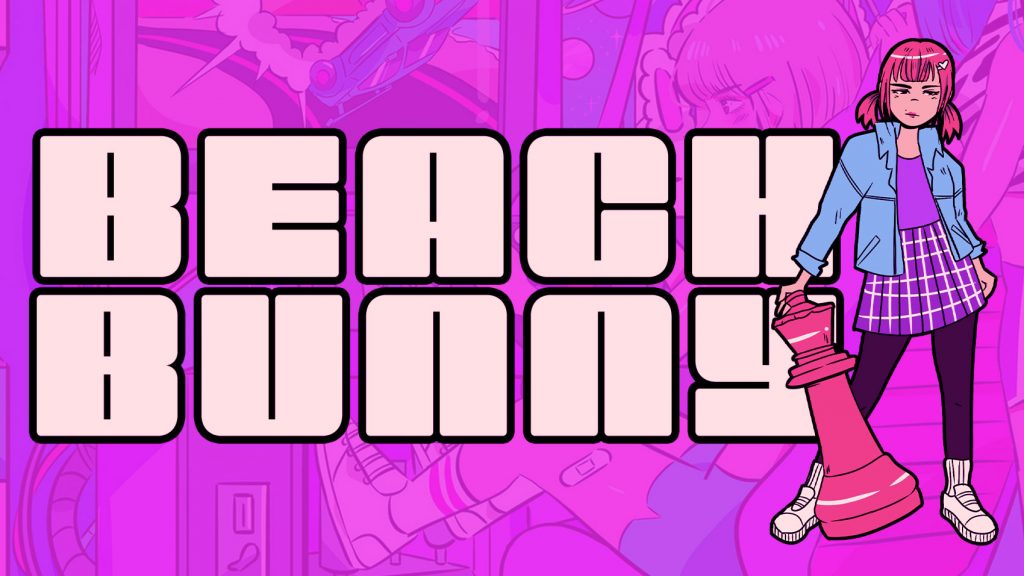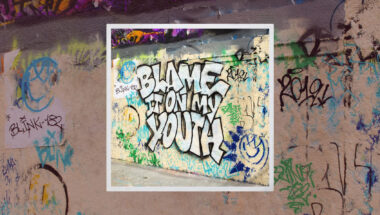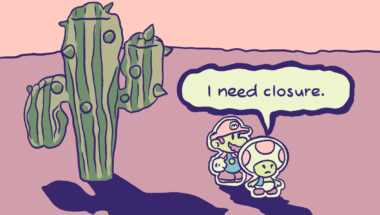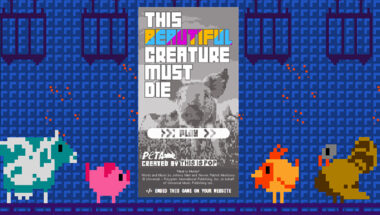When the COVID-19 pandemic cancelled what would have been Beach Bunny’s first tour of Europe, lead singer and guitarist Lili Trifilio locked herself in her room and started experimenting with making beats on her computer to pass the time. Her other band members embarked on similar experimental personal projects until they were able to meet safely in person. The result of this isolation was Blame Game, a four-song EP released on January 15, 2021. It wouldn’t have come to fruition if the band had been busy touring overseas.
It’s been just a month since the EP’s release, but the pop rock group is already in the studio recording their second full-length album. We spoke to Trifilio about the stories she tells through her songs, her writing process in quarantine, and her drive to have more creative control over the band’s music videos and marketing decisions.
Your latest EP, Blame Game, has some amazing artwork—and even a video game—tied to its release. How did you connect with Stephanie Priscilla, who designed the cover art?
Stephanie actually had made a fan art drawing for our single, “Sports,” a while back. I remember when I saw her art, I followed her on Instagram; going into Blame Game, I had her as an idea in the back of my head. A lot of the previous Beach Bunny EPs I had just drawn cover art for myself, but my abilities only go so far. I knew we should hire a real artist, and I genuinely am a really big fan of her art.
I was so excited to see the online Blame Game video game—it felt like one of those games Disney Channel used to promote their shows back in the day. Whose idea was it to release a Beach Bunny game?
That’s honestly a great analogy. Going into the EP—as with every body of work we have—I usually have some sort of theme in mind. I was trying to go for a gamer girl aesthetic and play off the EP’s title, basically. Graham Nesbitt, who drew the Prom Queen artwork, his main thing is making music for video games. We thought we’d hit him up and see if he could whip up anything, and we also have some gaming friends, so it was kind of a collaboration with people we already knew and were friends with, which was really cool.
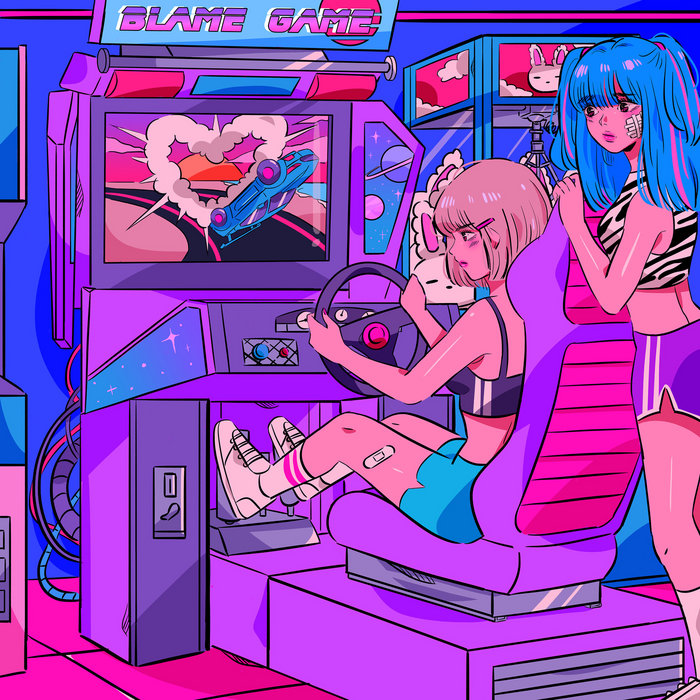
You’ve always told stories in your songs, but Blame Game seems to have a shift from telling specific stories to covering broader ideas. Is that an accurate take?
I think there is a lot of truth to that. There were definitely very specific people in mind that I had written those earlier songs about. With Blame Game, I feel like I was trying to look at patterns in what I was experiencing. Honestly, I feel like a lot if it has to do with the pandemic—having realizations and reflecting during this time made me look back at a lot of toxic relationships and break them down into these four songs.
Was the pandemic the biggest influence on your shift in storytelling?
Honestly, I think it played a huge impact. For starters, we were supposed to be on tour all year, so I really don’t know if this EP would have happened. It really wasn’t scheduled… maybe the songs would have been on an album.
In terms of emotions, I haven’t let myself be angry. I would always put myself down when things went wrong. This year, having a lot of space and quiet time brought all that suppressed anger out, and I felt very enraged for six months. I had to process a lot of that.
What does the band’s recording/practice schedule look like during a pandemic?
It’s hard. We initially thought this pandemic would be over in a couple weeks, so we’d just wait it out. Even though I can send demos online, we really can’t have a proper practice over Zoom. It just doesn’t work. I was sending voice memos and asking, “What do you guys think?” and everyone would be like, “Oh, it’s good.” But I don’t think anyone was trying to jam on it.
I had all these songs sitting for a couple months. It really wasn’t until summer we were able to practice, and even that was pretty inconsistent because we were scared and wanted to be responsible. In early September, we recorded when cases were pretty low. We were in the studio with masks on, social distancing the best we could, and making sure we were getting tested. But we were still asking ourselves, “Should we be doing this? Is this necessary?” At the same time, the world right now probably needs music more than anything.
Were there any new skills or sounds you guys brought to the studio after spending time apart in quarantine?
In quarantine, I got really addicted to making beats on my computer. It was something to pass the time—I still do it, but not as much because the wintertime is uninspiring for me. The boys have been making their own stuff out of boredom, too. So when we all came together, it was more of a co-producing experience rather than being very straightforward like it normally is. We normally record all the instruments we play live and call it a day. But [recording the next album] has been a lot more of “Hey, I’m going to go hop over there and add this synth sound on the chorus, or I’m going to do this weird harmony. Let’s add some piano chords.” You can’t hear it very well, but it just makes it all sound really big.
Would you have gotten to that point as a band naturally, or was that progression fueled by being isolated?
That’s a really good question. Maybe we would have eventually, but I feel like it would have been someone else telling us to do it instead of us being like, “Yeah, we know how synths and pianos and these other sounds work. It could work here, so let’s just jam it.”
I definitely think [the pandemic] is like a catalyst. I’ve heard other people say similar things of how they’ve just had to hone in on their skills or try to master something because that’s the only thing we can do in these times— lock ourselves in the room and try to make something with the stuff you’ve got.
Thinking back a few months, what was it like switching from traditional live performances to drive-in shows?
It was pretty strange. We played a drive-in show with the band Whitney, and then the Halloween drive-in show was super cold. Being outside on the stage playing lead guitar, my nail beds were all cut up, my fingers were bleeding. It was quite a painful show. And it was also very strange not being able to see the fans. But when people were honking, you knew they were there. Some people were sitting on top of their cars but it was pretty cold. I think if it had been warmer out, people would have been standing outside their vehicles. But it was honestly nice being able to share that moment, even if it was kind of weird circumstances.
Hopefully in the spring we can do more of those. We’re all dying to do anything, honestly. And if [playing drive-in shows] is what we’ve got to do, then that’s what we got to do.
Let’s talk more about the new album you’re working on. You said Blame Game is reflective and looking back. Is this new album looking forward?
I’m usually writing about whatever I’m currently experiencing. Right now my experience is being in a very healthy, happy relationship. I’ve been collecting songs over the last year—there’s a couple sad songs, but I would say the majority are pretty happy. I feel like I really have to be tapped into whatever emotion is going on… it’s like the songs almost write themselves, like a therapy session with myself. I’m just getting it all out of my system, which is cool because I can be vulnerable. But it’s also a little bit stressful because I can’t really force a certain topic. I just have to wait for it.
Sonically, we’re trying to… well, not be more “experimental,” that’s not the right term. But when I was in the studio the other day, there was a lot of co-producing and trying new things and adding more instruments. So I think [the new album] might be a lot more full sounding, or there might be some other wacky sounds. We’re planning to hunker down and crank these new songs out. We really want to get them out this year if possible.
Do you think your fans who adore your sad girl pop songs won’t be interested in hearing happier music?
I’ve definitely thought about it. I feel like there’s two solid sad bangers on this album that I’m hoping will satisfy their needs. But people were receptive of the angry songs on Blame Game. Honeymoon is very self-deprecating, and some people really loved and gravitated towards that. And then other people really like how Blame Game’s very empowering and taking back power.
I’m hoping the people listening are growing along with me. Everyone has been very supportive. I thought “Prom Queen” [the self-titled track off the Prom Queen EP] was going to be a B-side flop song, but everyone likes that one, even though it wasn’t a love or breakup song.
On a more professional level, are there any roles you feel you’ve stepped into that surpass just being an artist? How involved will you be in the art and videos that accompany this new album?
I’m pretty much a control freak. I get very nit-picky on how everything works. With this next campaign, especially since it’s an album, I really want to make everything perfect.
I’m hoping to step into a director role with the music videos. In the past, I’ve just done the acting part, but I really want to write scripts. Past music videos have been a collaborative concept: I come with a big picture, and then people would help merge or brainstorm ideas. With this [album], I want to be super hands on everything—just because I don’t really like compromise, to be honest. I feel like the pandemic has actually taught me a lot about needing to be assertive, which I’m pretty bad at. I’m working on that.
In terms of roles, I didn’t realize how much social media plays a giant role in advertising. Most bands have to pretend that they’re influencers online. You definitely have to post regularly and maintain socials to get the word out on music, which has its pros and cons, but sometimes it does make me stress.
Do you enjoy the role of an influencer? Or is it a part of the job you’re not a fan of?
It kind of comes in waves. When releasing music, though, it can be super stressful, and my screen time goes up so much. It’s not like you can post and then delete the app. I need to reply to comments all day; if anyone puts us on a playlist, I have to upload it. That kind of stuff.
It’s not hard work, it can just be a little bit mentally exhausting—especially when everyone’s talking about you. If someone said something not very nice, that can totally ruin my day. I don’t want to look, but then I have to look, because I’m posting.
How do you manage posting for the band, but also wanting to go online and post personal things or see pictures of your friends—as well as wanting to reduce overall screen time?
I’m still working on it. I definitely have taken a couple month-long breaks during the pandemic when music hasn’t had to be shared. I’m hoping with the new album release, we can bring someone on board to help. It’s not like I’m just posting an ad—I’m posting about myself, so it gets into a weird identity thing.
Sometimes, when it’s release time and I’m posting so much, I get self-consciousness about going overboard or being annoying online because I have personal friends and family mixed in with my socials. I don’t want them to think I have this giant ego, but I have to post to advertise. When I started in 2013, I think I assumed that once you get signed you have someone else do it for you. With the current Internet, everyone wants authentic interaction—I wouldn’t really feel comfortable having a label using my voice, pretending to be me.
You can grab a copy of Blame Game today on vinyl, CD, and cassette over at Beach Bunny’s Bandcamp—as well as their website, where you can browse through a colorful, 8-bit assortment of Blame Game merch.
